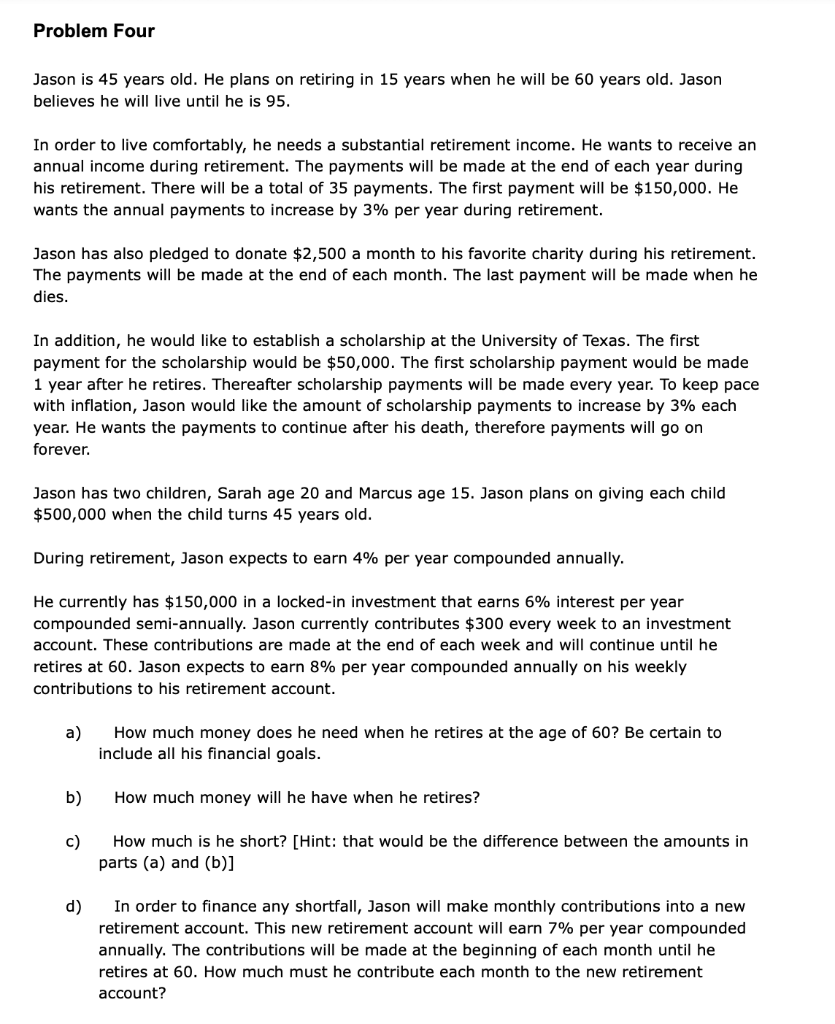
Problem Four Jason is 45 years old. He plans on retiring in 15 years when he will be 60 years old. Jason believes he will live until he is 95. In order to live comfortably, he needs a substantial retirement income. He wants to receive an annual income during retirement. The payments will be made at the end of each year during his retirement. There will be a total of 35 payments. The first payment will be $150,000. He wants the annual payments to increase by 3% per year during retirement. Jason has also pledged to donate $2,500 a month to his favorite charity during his retirement. The payments will be made at the end of each month. The last payment will be made when he dies. In addition, he would like to establish a scholarship at the University of Texas. The first payment for the scholarship would be $50,000. The first scholarship payment would be made 1 year after he retires. Thereafter scholarship payments will be made every year. To keep pace with inflation, Jason would like the amount of scholarship payments to increase by 3% each year. He wants the payments to continue after his death, therefore payments will go on forever Jason has two children, Sarah age 20 and Marcus age 15. Jason plans on giving each child $500,000 when the child turns 45 years old. During retirement, Jason expects to earn 4% per year compounded annually. He currently has $150,000 in a locked-in investment that earns 6% interest per year compounded semi-annually. Jason currently contributes $300 every week to an investment account. These contributions are made at the end of each week and will continue until he retires at 60. Jason expects to earn 8% per year compounded annually on his weekly contributions to his retirement account. a) How much money does he need when he retires at the age of 60? Be certain to include all his financial goals. b) How much money will he have when he retires? c) How much is he short? [Hint: that would be the difference between the amounts in parts (a) and (b)] d) In order to finance any shortfall, Jason will make monthly contributions into a new retirement account. This new retirement account will earn 7% per year compounded annually. The contributions will be made at the beginning of each month until he retires at 60. How much must he contribute each month to the new retirement account? Problem Four Jason is 45 years old. He plans on retiring in 15 years when he will be 60 years old. Jason believes he will live until he is 95. In order to live comfortably, he needs a substantial retirement income. He wants to receive an annual income during retirement. The payments will be made at the end of each year during his retirement. There will be a total of 35 payments. The first payment will be $150,000. He wants the annual payments to increase by 3% per year during retirement. Jason has also pledged to donate $2,500 a month to his favorite charity during his retirement. The payments will be made at the end of each month. The last payment will be made when he dies. In addition, he would like to establish a scholarship at the University of Texas. The first payment for the scholarship would be $50,000. The first scholarship payment would be made 1 year after he retires. Thereafter scholarship payments will be made every year. To keep pace with inflation, Jason would like the amount of scholarship payments to increase by 3% each year. He wants the payments to continue after his death, therefore payments will go on forever Jason has two children, Sarah age 20 and Marcus age 15. Jason plans on giving each child $500,000 when the child turns 45 years old. During retirement, Jason expects to earn 4% per year compounded annually. He currently has $150,000 in a locked-in investment that earns 6% interest per year compounded semi-annually. Jason currently contributes $300 every week to an investment account. These contributions are made at the end of each week and will continue until he retires at 60. Jason expects to earn 8% per year compounded annually on his weekly contributions to his retirement account. a) How much money does he need when he retires at the age of 60? Be certain to include all his financial goals. b) How much money will he have when he retires? c) How much is he short? [Hint: that would be the difference between the amounts in parts (a) and (b)] d) In order to finance any shortfall, Jason will make monthly contributions into a new retirement account. This new retirement account will earn 7% per year compounded annually. The contributions will be made at the beginning of each month until he retires at 60. How much must he contribute each month to the new retirement account







